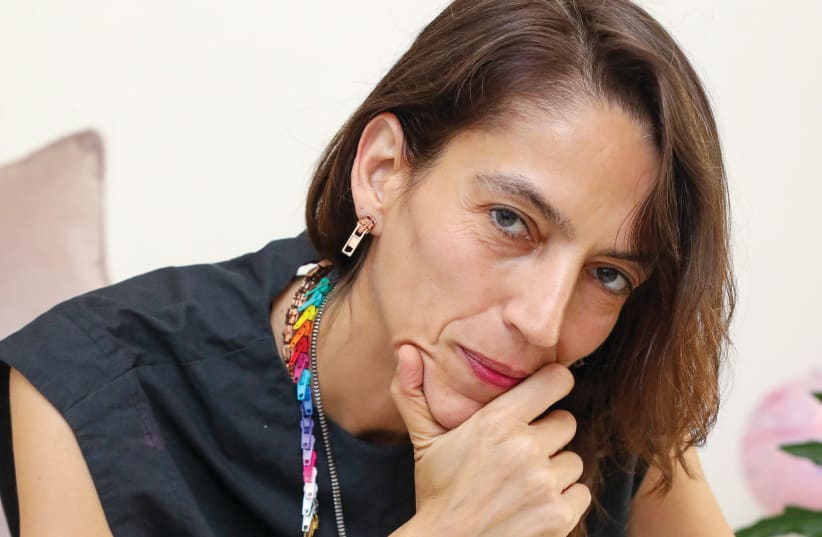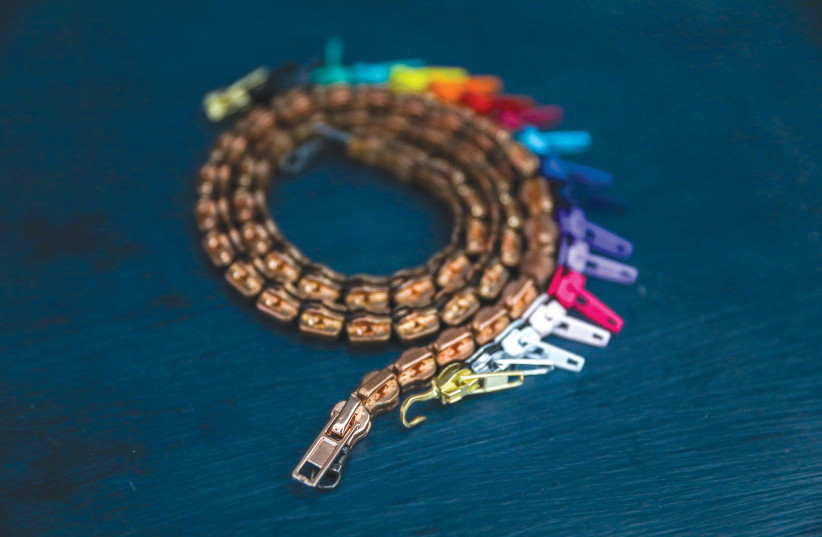Adi Avishai Hitchcock gave me a heads-up that she curses a lot when she speaks. She lived up to that warning. The Israeli entrepreneur’s fast-clipped conversational style, rife with philosophical pronouncements, seems right on par with the creative life she fell into.
I met with Hitchcock on a sunny Tuesday in her home office in the Arnona neighborhood, scattered with her jewelry and workout equipment.
Hitchcock sat across from me dressed in a black sleeveless shirt that she designed, frequently getting up to rearrange her legs beneath her seat.
Her body repositioning, much like her speech patterns, was indicative of a somewhat restless mind, constantly looking to create and spring into action.
Hitchcock believes that the chaos in her life is finally dying down. She currently has 30,000 pieces of inventory ready to go; after much haggling with an internship organization, she relented to hiring an intern she ended up finding incredibly helpful; and she’s just as confident in her product, if not more so than when she first had the idea for jewelry made out of zippers in 2014.
However, her interest in the world of jewelry, and zippers in particular, didn’t come until a couple of decades into her life.
Getting into zippers and the world of jewelry
Hitchcock grew up in Jerusalem before she moved to Miami with her father at the age of 12, spending the next few years in Florida. She then moved back to Israel to serve in the IDF and attended Reichman University and Hebrew University.
Her studies spanned law, business and plant sciences, never crossing into design or the art world. “I didn’t go to Bezalel [Academy of Art and Design] to study art and to become an artist, but [the biblical] Saul went to look for donkeys and he got the kingdom of Israel – so I’m saying I’m for real. Sometimes you go to look for A and you get B.”
Like many creative minds, Hitchcock got her start in the world of jewelry in New York City, where she moved after college.
She was dating someone at the time who was immersed in the world of fashion in the city. “He was the only straight man in this environment – this good-looking, straight man. And a gentleman, a mensch.”
He had picked up a harmonica “in Ibiza or something,” strung the folksy instrument onto a chain and started wearing the homemade necklace to trade shows the couple went to for his clothing company.
Visitors kept wanting to buy his necklace, so like any good businesspeople, the young couple saw the demand and created supply. They developed a harmonica necklace line, which Hitchcock ended up running on her own and owning after the two broke up.
“It just became a business, and I’ve been eating and drinking and buying diapers for my daughter from that,” she said.
Each of the harmonicas, while smaller than a typical one you’d find, is functional and plays a full octave. If you want a product review, reach out to Justin Timberlake and Paul McCartney, who both own one.
Hitchcock now works with a goldsmith in Jerusalem to make harmonicas out of elevated metals, including silver and gold.
Her harmonica necklace line and now her zipper jewelry business derive from the concept of a mono-product (brands launching with just one product).
“I believe in God and from there derive all my mono theories about products,” she said. She’s passionate about taking a single item and iterating on its colors, materials and designs to create a diverse product line.
She’s now taking that love of mono products and moving into the world of zippers.
Hitchcock had a eureka moment in 2014 when she got her hands on some zippers and saw the potential within them to create a new type of jewelry.
“I find things that are just pretty boring; with people, with animals as well, with anything where the outside is appealing and that’s it,” she said. “I wanted to take something mundane and everyday and twist it and bring it to the toy world, to the accessories world, to the jewelry world.”
She worked with partners to develop two patents for the technology behind her zipper jewelry, and in 2018 a gift shop in the Museum of Contemporary Art in Chicago became the first location to sell her zippers.
RIGHT AFTER she got her work out in the open is when her problems started.
Divorce and the pandemic knocked a two-fist punch into her plans. “It took me out of anything I did into hell for three years.”
When she exited hell, she was armed with her approved patents, investment money and a fresh load of energy to funnel into her company.
“In Hebrew, there’s a saying that everything that’s postponed is postponed for the best,” she said as birds chirped outside the window. “I feel this sentence is very much right, time and again in my life.”
She now wakes up at 5 a.m. every morning to work. “It’s overwhelming just because I’m such a great believer in what I do, and there are so many things I can achieve and do and there are not enough hours."
Her zippers are now designed with the phrase “Zero Rules” marked onto their backs. That was one of the names she was mulling over for her company before she landed on Zippaz – based on how a Jewish New York business partner of hers pronounced the word “zippers.”
“The whole schtick about the zippers is that you put them together, you marry them,” she said. “The bracelet is not it, it’s the game.”
She explained how the design works while taking a few of the zipper lengths and connecting them, demonstrating the ease with which customers can merge the jewelry segments to create new looks.
Her educational background in plant sciences, while not directly useful, was part of the background she used to create her design. “I could make the contact between organic chemistry and jewelry and accessories and toys – how to put things in space at different angles to create different results.”
Coupled with that scientific background was a pull within her to continue playing.
“I have a natural instinct to play,” she said. “I’m supposed to be at the age where you just don’t play, but I think we forever play. I hope that everyone forever plays.”
“I’m supposed to be at the age where you just don’t play, but I think we forever play. I hope that everyone forever plays.”
Adi Avishai Hitchcock
With Zippaz jewelry, people can tinker with product combinations and play around with the designs in a way that isn’t possible with most jewelry.
Of late, she’s gotten her work into stores across Israel, including the Israel Museum and a fashion store in Tel Aviv called Ossef.
Just a few weeks ago, the Tel Aviv Museum of Art accepted some of Hitchock’s jewelry to sell. A day later, a salesperson texted her that customers bought three Zippaz pieces and that she loved selling her work. For her, “it’s like the love of my life telling me he loves me.”
For anyone gripped by Hitchcock’s spirit, she has advice.
“I urge people to not follow the book,” she said. She said the common book in Israel is to finish school, go to the army, travel abroad for a bit, and then settle down and join a respected profession, like becoming a doctor or lawyer.
“It’s like death for me,” she said, acknowledging that some people genuinely do find joy in those traditional career paths. “I think it’s death for humanity, in general. Where’s your spark? Have you ever really thought about what you wanted to do?”
But just like everyone else, Hitchcock knows she is still figuring out her own book in many ways.
“I’m not saying I’m the most peaceful person,” she said. “But at least I’m aware of it, I’m aiming there.” ❖


